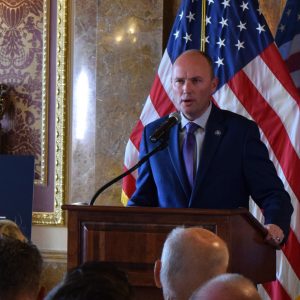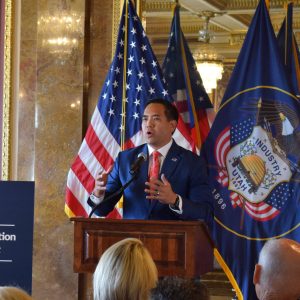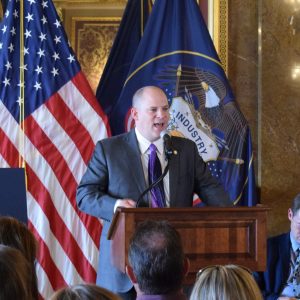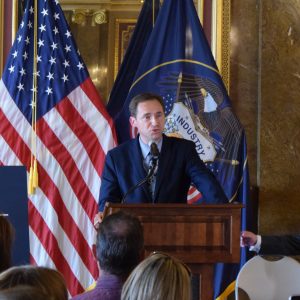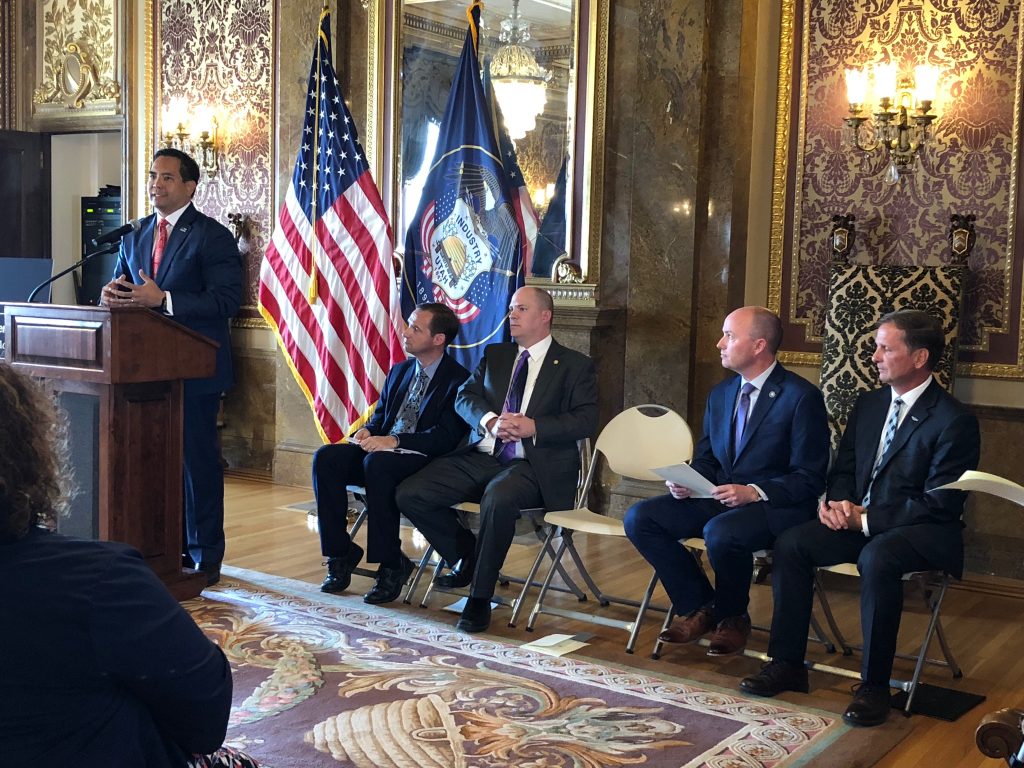Posts Tagged ‘suicide prevention’
FCC Unanimously Designates 988 as New Three-Digit Suicide Hotline
June 16, 2020
Today, the Federal Communications Commission (FCC) voted unanimously to designate 988 as the new three-digit suicide hotline.
Currently, callers can reach the hotline at 1-800-273-8255 (TALK). With the FCC’s ruling, service providers will have a two-year transition period, with implementation of the three-digit hotline to be finalized by July 16, 2022. During this transition, all crisis calls to the hotline should continue to be directed to the current, 10-digit number. After the transition is completed, callers will still be able to reach the hotline by calling the 10-digit number.
The designation of the three-digit hotline comes at a time when it is needed most. Suicide is the 10th leading cause of death in the United States, according to the Centers for Disease Control and Prevention. In Utah, suicide is the 7th leading cause of death, putting Utah with the 6th highest rate of suicide in the nation.
The idea for a three-digit suicide prevention hotline was first conceived right here in Utah. Utah Senator Dan Thatcher first proposed the idea for a three-digit suicide prevention line in 2012, but it didn’t gain traction in the Legislature at that time. Senator Thatcher partnered with the Utah Attorney General Sean D. Reyes, Wade Farraway, Missy Larsen, and others at the Utah Attorney General’s Office in 2014. The group started the SafeUT app as a way to reach Utahns in crisis while still campaigning for the three-digit number. In 2017, the group enlisted the help of Rep. Chris Stewart and Sen. Orrin Hatch, who presented the idea on the federal level. This has led to the designation of the three-digit number 988.
We are grateful for our partners for working diligently with the Utah Attorney General’s Office to get a three-digit crisis line off the ground and to the FCC for prioritizing suicide prevention.
If you or someone you know is struggling and/or having thoughts of suicide, please reach out. Call the National Suicide Prevention Lifeline at 1-800-273-TALK (8255), text the Crisis Text Line (text HELLO to 741741), or message a trained crisis counselor through the SafeUT app. These support lines are available 24/7, 365 days a year.
Read the FCC’s press release here.
A Look into SafeUTNG
December 16, 2019
Since 2015, the SafeUT app has provided professional mental health support for youth in crisis. Lives have been saved amid tens of thousands of chats and tips generated on the app. Now, there is a similar resource for members of Utah’s Army and Air National Guard: SafeUTNG.
SafeUTNG is a new suicide prevention, crisis text and tipline, available to Utah military service members and their families. Like the SafeUT app, SafeUTNG provides a safe, confidential platform to communicate with a crisis counselor 24/7.
In 2018, 541 service members died by suicide. According to a report by the Department of Defense in September 2019, the suicide rate in the National Guard was significantly higher than the active duty and Reserve’s. The most recent figure is 30.6 deaths per 100,000 service members. Additionally, the majority of service members who die by suicide were not diagnosed with mental illness. SafeUTNG hopes this new, multi-faceted platform will make a difference and save lives, similarly to the success of the SafeUT app.
The SafeUTNG app is an extension of SafeUT, which provides real-time crisis intervention to Utah’s students, parents, and educators, and works similarly. Crisis help is available through texting and calling. Additionally, the app allows service members to submit tips anonymously. The app is managed by the University of Utah Neuropsychiatric Institute (UNI) in partnership with the Utah National Guard.
“Speaking up when in crisis, whether it’s in person or over the phone, can be uncomfortable for many,” said Robert Spencer, Suicide Prevention Program Manager of the Utah Army National Guard in a release regarding the SafeUTNG app. “Communicating via apps or text has been the main way in which Soldiers and Airmen prefer to correspond.”
The app emphasizes that it should not be used in an emergency. Instead, users are encouraged to dial 911.
CrisisLine Counselors can assist with a wide variety of problems including:
- Emotional crisis
- Grief and loss
- Drug and alcohol problems
- Mental health issues
- Self-harm
- Suicide prevention
SafeUTNG is free and available for download from the Google Play Store and the App Store.
FCC Votes to Proceed Designation of 988 as New Suicide Prevention Hotline Number
December 13, 2019
Yesterday, the Federal Communications Commission (FCC) voted to proceed with the process of designating 988 as the new, nationwide, 3-digit number dedicated as a suicide prevention and mental health crisis line. This number will replace the current, 12-digit number 1-800-273-8255.
“This designation will help ease access to crisis services, reduce the stigma surrounding suicide and mental health condition, and ultimately save lives,” the FCC said in a release Thursday.
This decision follows a report the FCC’s Wireline Competition Bureau and Office of Economics and Analytics sent to Congress in August recommending a 3-digit dialing code as the crisis hotline. The report noted a more than 20% increase in suicides in over most of the nation from 1999 to 2019. It also noted increasing suicide rates in Veterans and the LGBTQ community.
“This is 911 for mental and behavioral crises. And this emergency number started right here in Utah, with amazing partners like Senator Daniel Thatcher and this office demanding more be done to address the alarming suicide rates in this nation,” said Utah Attorney General Sean D. Reyes.
“We couldn’t get it passed at the state level, so we pushed to the federal level. Senator Hatch and Congressman Stewart were our champions. It’s amazing to finally see it come to fruition. It is one of the achievements in public service of which I am most proud.
“A simplified three-digit suicide and mental and behavioral health hotline will make a huge difference when it comes to intervention and prevention. It will save lives! No doubt,” Attorney General Reyes added.
All telecommunication carriers and interconnected Voice over Internet Protocol service providers must implement the 988 number within the next 18 months.
The Commission will begin taking public comment on the Notice of Proposed Rulemaking following publication in the Federal Register. Following review of that public record, the Commission will move toward final rules.
The change to the 988 hotline will not be implemented for several months. If you or someone you know is struggling with mental health or contemplating suicide, please use the SafeUT app to speak with a crisis counselor for free or call 1-800-273-8255 (TALK).
Utah Suicide Rate Decreases for First Time in Over a Decade
November 15, 2019
For the first time in over a decade, Utah’s suicide rate fell slightly in 2019, according to the fiscal year 2019 report of State Suicide Prevention Programs by the state Division of Mental Health and Substance Abuse. This decrease means that we are doing something right, but the work isn’t done. Now is the time to increase our efforts.
According to the report, the suicide rates dropped from 22.7 to 22.2. “The decrease is not statistically significant nor does it represent a trend change, however, it is worth noting given the year-over-year increase for many years,” said the report. Suicide remains a leading cause of death in the State of Utah. An average of 592 Utahns die by suicide each year, and an average of 4,538 Utahns attempt suicide.
Below is an excerpt from an article written by Marjorie Cortez in the Deseret News: After decade of increases, Utah’s suicide rate dropped slightly in 2018, report says.
At first glimpse, there was a lot of excitement, even tears, when the 2018 data indicated Utah’s suicide rate had not increased over the previous year, said Michael Staley, with the Utah Office of the Medical Examiner.
“Then there was this moment of pause, where we kind of had to look around and say, ‘But what does this mean?’
“I think that is so important to remind folks this is not the time to pack our bags and go home and call this a win. This is the time to double down on what we’re doing because there’s evidence here, even though it’s kind of arbitrary and not causal, but there seems to be some suggestion here that what we’re doing is working,” said Staley, who coordinates suicide prevention research.
Barry Rose, crisis services manager for the University Neuropsychiatric Institute, said the slight decrease “at least indicates we’re on the right track and we’ve made some investments that are paying off.”
Reducing suicide deaths “was really our first major goal, not that our group here is the reason this happened, but we would like to think we were part of it. I think all of us collectively, our goal as the state, county mental health division and everyone involved, is just to see we could stop it from increasing, at least to level off, and continue to work toward decreasing those numbers,” he said.
Much work remains, Staley said.
Suicide is the seventh-leading cause of death in Utah, and the suicide rates in the Rocky Mountain states lead the nation. According to the American Foundation for Suicide Prevention, Utah’s suicide rate ranks sixth nationally. Montana has the highest rate followed by Alaska, Wyoming, New Mexico and Idaho, according to the foundation.
The most recent data says 6,039 Utahns were seen in emergency departments for suicide attempts, according to 2014 numbers, and 2,314 Utahns were hospitalized for self-inflicted injuries including suicide attempts.
The Division of Mental Health and Substance Abuse report also notes that self-reported suicide attempts decreased from 7.1% to 6.9% from 2017 to 2019 after multiple years with increases.
Utilization of the SafeUT app, which provides 24/7 real-time crisis intervention for youths, is also growing. In the month of October, the app received 3,700 tips and chats.
Suicide prevention starts with each of us. Download the SafeUT app, reach out to those around you, listen without prejudice, and offer support.
If you or someone you know is struggling and/or having thoughts of suicide, please reach out. Call the National Suicide Prevention Lifeline at 1-800-273-TALK (8255), text the Crisis Text Line (text HELLO to 741741), or message a trained crisis counselor through the SafeUT app. These support lines are available 24/7, 365 days a year.
The Utah Attorney General’s Office is proud to partner with organizations such as the Jason Foundation, the SafeUT Commission, the University Neuropsychiatric Institute (UNI), and Life’s Worth Living Foundation. These organizations help raise awareness of the prevalence of suicide in the State of Utah and provide resources and education on suicide prevention.
World Mental Health Day 2019
October 10, 2019
Today, the Utah Attorney General’s Office observes World Mental Health Day to bring awareness about mental health and to recognize and acknowledge the need to advocate against the social stigma. With this year’s theme placing an emphasis on suicide prevention, we underscore that you are not alone. You are loved and you are greatly needed.
Mental health is prevalent among everyone from all walks of life. People of every race, gender, sexual orientation, age, or socioeconomic status are affected by mental health challenges. According to the Kem C. Gardener Policy Institute’s 2019 report on Utah’s Mental Health System, our country is in the midst of a mental health crisis with increasing suicide rates, untreated anxiety and depression, and a prevalence of serious mental illnesses. Utah has one of the highest rates of suicide in the country, where it is the leading cause of death for Utahns ages 10 to 24. Tragically, Utah ranks the lowest in the nation for mental health, with a higher prevalence of mental illness and lower rates of access to care.
Unfortunately, despite the rising mental health crisis, the social stigma against mental illnesses remains a consistent presence. Ending the stigma is complex and will not happen overnight. While treatment and support are available for those that need it, the lines of communication must be open. The importance and inherent need for an open, understanding mind are more crucial than ever. The first step starts with listening to understand and simply be there for those around you.
For World Mental Health Day, we urge you to listen when someone reaches out to you. We urge you to have those important conversations about mental illness and educate yourself on what mental health is and then help teach others. Additionally, we urge you to be kind to those around you. Everyone is juggling a lot in their lives, whether it be stress, disappointment, grief, or pain, and all those things can add up quickly. Speak and act with kindness.
If you or someone you know is struggling, it is okay to get help. Doctors, counselors, and agencies are there for you with available resources and training. Call the National Suicide Prevention Lifeline at 1-800-273-TALK (8255), text the Crisis Text Line (text HELLO to 741741), or message a trained crisis counselor through the SafeUT app. These support lines are available 24/7, 365 days a year.
Reach Out for National Suicide Prevention Month
September 27, 2019
During the month of September, we observe National Suicide Prevention Month. It is a time to unite to remember those we’ve lost to suicide, and to reaffirm commitments to work together to drive research, community engagement, and provide the necessary resources to help those in need. This month, the Utah Attorney General’s Office urges everyone to reach out to those around them, to connect, and to be compassionate.
Suicide is a complex, public health issue that affects every person in every community. Despite the strides Utah has made in addressing this crisis, suicide is still a leading cause of death in our state. An average of 592 Utahns die by suicide each year. Even more staggering, is the average of 4,538 Utahns that attempt suicide. These are your neighbors, brothers, sisters, spouses, friends, colleagues, and children. Engaging with and caring for one another is the key to end the stigma that so often comes with mental illness and suicidal thoughts.
Despite the tragic number of people who have reported thoughts of suicide, who have attempted suicide, and those who have lost their lives by suicide, the topic is still met with silence and shame. We urge you to reach out, listen without prejudice, and offer support.
Listed below are resources and organizations dedicated to shining light on suicide prevention. These organizations will help you learn to recognize warning signs and know what actions to take.
- Utah Suicide Prevention Coalition
- Nami Utah
- Jason Foundation
- American Foundation for Suicide Prevention – Utah Chapter
- SafeUT Commission
- Life’s Worth Living Foundation
- University Neuropsychiatric Institute (UNI)
- Veterans Crisis Line
If you or someone you know is struggling and/or having thoughts of suicide, please reach out. Call the National Suicide Prevention Lifeline at 1-800-273-TALK (8255), text the Crisis Text Line (text HELLO to 741741), or message a trained crisis counselor through the SafeUT app. These support lines are available 24/7, 365 days a year.
The Utah Attorney General’s Office is proud to partner with organizations such as the Jason Foundation, the SafeUT Commission, the University Neuropsychiatric Institute (UNI), and Life’s Worth Living Foundation. These organizations help raise awareness of the prevalence of suicide in the State of Utah and provide resources and education on suicide prevention.
Three-digit crisis line on the horizon
At the Utah State Capitol, yesterday, U.S. Representative Chris Stewart hosted a celebration of The National Suicide Prevention Hotline Improvement Act which was signed into law last week. The Trib headline was perfect: Amid tears for the lost, Utah leaders celebrate new law to help create a new national suicide hotline. You can read the article here.
Related – Deseret News: A three-digit suicide crisis line could launch next year
This was an emotional event. Rep. Stewart kicked it off by taking a moment to remember those lives that were lost and applauded all who have worked to make a three-digit crisis line a reality.
A Utah idea intended to help 3 million people will now impact the lives of over 300 million Americans of all ages.
Listen in here.
Utah Attorney General Sean Reyes spoke about why the passage of this act is a game-changer for Utah teens, veterans, and how everyone across the nation will now benefit from it. If you haven’t read AG Reyes’ op-ed on the topic, here’s a link.
For those who came in late, the three-digit suicide hotline was the subject of a bill by Utah Senator Daniel Thatcher over 4 years ago. That idea met unexpected political opposition locally, but morphed into the creation of the SafeUT Commission and eventually the popular, effective SafeUT app.
At the same time, U.S. Representative Chris Stewart and U.S. Senator Orrin took Senator Thatchers original idea back to Washington, D.C. and the rest is history.
Thank you for paying attention, and thank you for all you do to guard and protect those around you.
You can watch the entire conference below.
Last but not least – thanks, Senator Hatch, for your support from afar!
Sen Hatch was unable to be in Utah today to join those celebrating the Suicide Hotline bill becoming law, but he spoke on the floor and thanked those back home that helped along the way, including @RepChrisStewart @SenThatcher @repsteveeliason @SpencerJCox @SeanReyesUT. #utpol pic.twitter.com/zuGkBN20SS
— Senator Hatch Office (@senorrinhatch) August 21, 2018
Op-ed: Three-digit suicide lifeline is a huge victory for Utah
In an op-ed published in the Deseret News on July 27th, Attorney General Sean Reyes shares the history of the three-digit number for mental and behavioral crises. A journey which started with a few in Utah – and led to the creation of the SafeUT app – reached a milestone as the U.S. House of Representatives overwhelming voted in favor for the creation of a National Suicide Hotline.
By Sean Reyes
Utah Attorney General
With the American public focused on myriad issues in the media, Congress quietly passed a bill this week that is a game-changer in preventing death by suicide and supporting those contemplating it.
Suicide is the leading cause of death for teens in Utah. It has increased exponentially over the past 20 years. And across all age demographics, Utah has some of the highest per capita suicide losses in the nation.
There are many theories about why this is. No one knows exactly all the reasons. We do know there are hyper-vulnerable populations like veterans, LGBTQ youths, and victims of abuse. We know that depression is one of the largest drivers. Bullying, isolation, traumatic incidents, or addiction can also be major contributors.
We also know there is too much stigma, shame, and judgment when it comes to those grappling with mental and behavioral challenges. When someone gets cancer, the neighbors pull together to support them; when someone is diagnosed with mental illness, the neighbors gossip. The person in pain is often assumed weak or somehow deserving of his or her circumstances. Families are sometimes embarrassed.
Some fear that talking about suicide will encourage it (studies show this is not the case). Many lack an understanding of how to even address the unthinkable. Avoiding the topic, though, has done nothing to help those in crisis, those who are hurting and feel alone, those who are silently suffering.
Long before I came into office, I supported friends and families dealing with suicide ideation, suicide attempts and, in the most tragic cases, death. As an ecclesiastical leader, I felt a great responsibility to help but realized my own ignorance and at times, insensitivity. It seemed there were few resources for those trying to support and particularly for those suffering.
When I became attorney general in 2013, I knew we had to do more as a state. Too many youths were turning to suicide to escape pain, loneliness, addiction and mental illness. Even one life lost to suicide is too many. In those days the biggest advocate I could find for suicide awareness was state Sen. Daniel Thatcher. He was informed, full of compassion, and relentless. Many discouraged him and me from prioritizing suicide resources and emergency intervention. Their “friendly” advice was that it was too dark to discuss and would hurt us politically.
Undeterred, Sen. Thatcher and I enlisted the help of state Rep. Steve Eliason in the 2014 legislative session to find ways to help those in crisis. My incredible chief of staff at the time, Missy Larsen, led our office’s initiative and testified with Sen. Thatcher in support of a three-digit number for mental and behavioral crises, similar to 911 for physical emergencies. Political opposition defeated our efforts, so we turned toward a smartphone app that could be a lifeline.
In 2015, with the help of the University of Utah Neuropsychiatric Institute, we created the SafeUT app. Today, trained mental health professionals chat, text, and counsel thousands of Utah teens through SafeUT. The program is credited with saving many lives across the state and has become a national model other states are seeking to emulate.
And yet, even then, we knew it wasn’t enough. The suicide rate remained too high. In 2016, conversations with Sen. Orrin Hatch and Rep. Chris Stewart gave new hope to create a three-digit line — not just in Utah but nationally. Sen. Hatch and his team were amazing. He sponsored legislation creating a national suicide hotline, passing the Senate in the fall of 2017 with the support of Sen. Mike Lee. Since that time, as the lead House sponsor, Rep. Chris Stewart and his dedicated staff have pushed the bill with House leadership, getting it passed this week with a vote of 379 to 1.
Creation of the three-digit National Suicide Hotline is a huge victory for Utah and our country. I thank Sen. Hatch and Rep. Stewart for successful passage of this landmark legislation. This further cements Sen. Hatch’s legacy as one of the greatest protectors of children and families in our nation’s history. I offer my gratitude to the many people around our state who have advocated for this bill, including Chief Missy Larsen, Councilwoman Aimee Winder Newton, members of the state’s suicide task force who have helped advocate for this measure, and especially state Sen. Thatcher and state Rep. Eliason. Soon, anyone can call a three-digit number and connect with a trained mental health professional who will listen, help, and connect them to resources that save lives.
At the root of all our efforts to prevent suicide is the need to connect, to feel valued, and to feel like we belong. Working together, we can make those around us feel valued and let them know that they matter. We can each do more to end or alleviate the causes of depression, loneliness, victimization, and mental illness. And while we try to diminish isolation and disconnectedness, we now have another tool to stop suicide and help those in crisis know there is hope.
Photo by Rodion Kutsaev on Unsplash
AG Reyes Recognizes World Suicide Prevention Day
SALT LAKE CITY September 10, 2017 – Attorney General Sean Reyes released the following extended statement marking World Suicide Prevention Day on September 10th, 2017.
“I appreciate the efforts of the International Association of Suicide Prevention (IASP) and all of its partners to educate the world on what is a global health threat. I join many other voices worldwide in support of raising awareness and resources to prevent a growing number of suicides. In the U.S., suicide is the tenth leading cause of death and a recent CDC study showed an increased suicide rate every year from 1999 to 2014 among both women and men and in every age group except those 75 and older. The rates of suicide for teens and Military Veterans are particularly alarming. Sadly, Utah is no exception.
“For the last three and a half years, the Office of the Utah Attorney General has led an effort to respond to increased teen suicide, the leading cause of death of Utah children, ages 10-17. We have teamed with legislators, state agencies, mental health clinicians, suicide prevention advocates, the faith community, educators, law enforcement, parents, and teens themselves to address the tragic reality that far too many of our youth feel there is no hope and life is not worth living.
“As we have traveled the state over the last several years, visiting with teens in groups or individually, so many of them have expressed feelings of being alone, judged, or without hope. While adolescence is or was a difficult transition time for nearly all of us, the isolation of today’s youth seems more prevalent and more deeply felt. Other factors like depression, being victims of bullying and abuse, eating disorders, drug use and addictions of various kinds, as well as other behavioral health and safety challenges can increase the risk of suicide among teens.
“Because Utah has one of the highest rates of teen suicide in the nation, my office has been leading the School Safety and Crisis Line Commission which last year unveiled the new SafeUT app. It is currently introduced in schools throughout Utah. Those teens in crisis can now access live trained professionals at any time the way they are used to communicating: through a free app on their smart phones available across Android, Apple or other platforms. With the SafeUT app our kids are never alone.
“We have also worked closely with legislators to create a three digit number similar to 911 in Utah for immediate response to mental health and behavioral crises, including thoughts of or attempts at suicide. This statewide effort has led to discussions and proposed legislation at a national level for a similar 911-type number.
“Like teens, the number of Military Veterans losing their lives from suicide across our nation is staggering. Daily, those losses number twenty or more. Utah has lost its fair share of Veterans who were willing to give their lives for their country and instead lost them battling personal demons and enemies seen and unseen that were often related to their service.
“We can all play a part in reversing Utah’s devastating trend of teen and Veteran suicide by having real conversations with friends, family, and neighbors. These may be difficult and uncomfortable discussions but the alternative–not communicating–rarely if ever leads to positive outcomes. I challenge all Utahns to engage daily in a positive way with teens and Veterans. Say hello. Recognize them. Smile. Be a mentor or friend. Find ways to connect and to serve them. While this is not a panacea or cure-all, it can go a long way to lifting someone out of darkness and despair. Truly, one of act of kindness can be the difference between life and death.”

Key Features of SafeUT
The SafeUT program and app help youth stay healthy and safe in schools by providing high-quality, confidential counseling services. The app’s key features include:
- Anonymous, confidential, and password protected services
- Real-time, two-way communication with SafeUT crisis counselors available 24/7
- Tips can be submitted with picture and/or video
- Mobile app works with Apple & Android devices
SafeUT’s Crisis Services
Safe UT answers crisis calls, texts, and chats – about yourself or someone else – 24/7. These services are anonymous and confidential. Our counseling topics include:
- Suicide
- Self-harm
- Emotional crisis
- Grief and loss
- Drug and alcohol problems
- Mental health
- Abuse
- Impact of domestic violence
# # #
Statewide Crisis Line, Suicide Prevention Efforts Moving Forward
Commission will work towards a single, statewide mental health crisis line
SALT LAKE CITY April 11, 2017 – With Attorney General Sean Reyes, Utah legislators, and mental health professionals, and supporters looking on, Governor Gary Herbert ceremonially signed SB 37, as well as two amendments to suicide prevention statutes, moving the state one step closer to a statewide crisis line. Sponsored by Utah State Senator Daniel Thatcher and Representative Steve Eliason, along with co-sponsors Representative Carol Spackman Moss and Senator Curt Bramble, the new law creates a commission to consolidate local mental health crisis lines. By integrating existing efforts into a single crisis line, the commission is tasked to create a single statewide line connecting individuals in a mental health crisis with a mental or behavioral health professional easier.
“Today, we move towards a statewide solution for all citizens. Over the past two years we have been fortunate to work with a full team of state leaders and agencies to launch the SafeUT Crisis & Safety smartphone app for Utah students,” said Attorney General Sean Reyes. “This service has offered direct access to the world-renowned mental health crisis responders at the University Neuropsychiatric Institute (UNI). Since its launch, thousands of Utah students have reached out to UNI for confidential and anonymous two-way communication with crisis counselors which has resulted in saved lives and healthier youth. State legislators Sen. Daniel Thatcher and Rep. Steve Eliason, sponsors of the Student Safety and Crisis Line Commission, have also led the efforts for a statewide Mental Health Crisis Line Commission. Today, as Governor Herbert signs their legislation, Utah is positioned to continue to lead the nation in this critically important response to those in mental health crisis.”
“The end goal of this legislation is simply that a plea for help will never go unanswered,” said Utah Representative Steve Eliason.
“I have never known a world without 911,” said Senator Daniel Thatcher. “In fact, it is difficult to even imagine not knowing where to turn for physical crisis services. Yet, almost 50 years later, that is exactly where we are with Mental Health. We now know that a behavioral or mental health crisis can be just as dangerous, and requires a very different type of response. Utah’s Mental Health Crisis Line Commission is the answer we have been looking for.”
# # #


